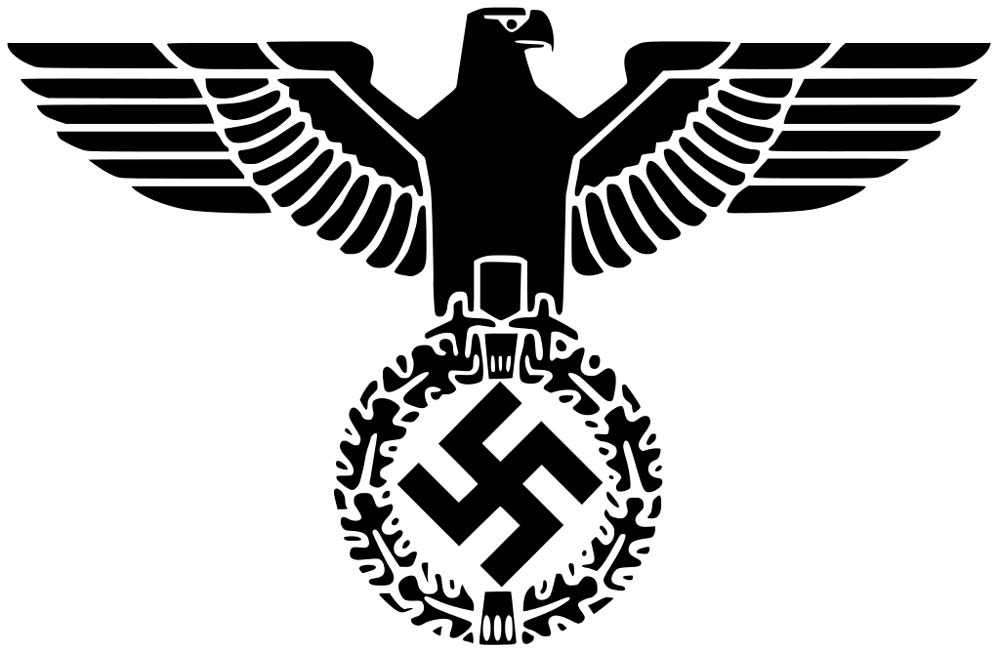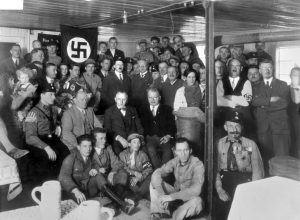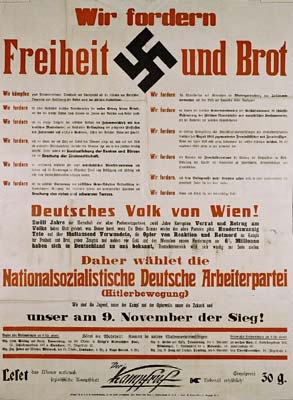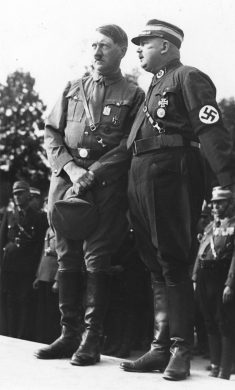 When most people think of the Nazi Party, they think of Adolf Hitler – and for good reason. However, most people erroneously consider Adolf Hitler the founder of the Nazi Party, which he was not.
When most people think of the Nazi Party, they think of Adolf Hitler – and for good reason. However, most people erroneously consider Adolf Hitler the founder of the Nazi Party, which he was not.
The Party’s Beginning
The Nazi Party was actually begun by a trio of German revolutionary thinkers named Anton Drexler, Gottfried Feder, and Dietrich Eckart in 1919. The original name of the organization was the German Worker’s Party (also known as the GPW) and the party took root in Munich.
As word of the party’s formation began to spread, the German Army became worried that it may be a revolutionary group that would cause problems for the army, and they dispatched Adolf Hitler to spy on the group. To Hitler’s pleasant surprise, he found that the party’s philosophies very closely mirrored his own, especially in the areas of German exclusive nationalism, as well as anti-Semitism. There were aspects of the group’s ideas that he did not agree with and, even though he was a spy, he could not resist the urge to stand up and deliver a heated oratory toward those who expressed ideas that were contrary to his own.
The passion of Hitler’s speeches soon gained the attention of Drexler, who soon invited Hitler to join the party. Encouraged by his commanding officers to accept the offer, Hitler joined despite being reluctant at first. The party was still very small, and Hitler was the 54th person to join.
In a short period of time, Hitler had persuaded others of the German Army to join the party. Perhaps one of the most important to join, besides Hitler himself, was one of Hitler’s commanding officers, Captain Ernst Rohm. Rohm’s importance to the party’s growth was due to the fact that he had access to the German army’s political fund and managed to discreetly transfer money from that fund into the German Worker’s Party.
The Party Grows Into A New Name
 The money siphoned from the German army fund was used to publicize the party’s platform and encourage others to attend the meetings, where Adolf Hitler was frequently listed as the main speaker. As his speeches increased in frequency, so did his skills as an orator. He soon became famous for his speaking abilities, and quickly moved up in power and stature within the party.
The money siphoned from the German army fund was used to publicize the party’s platform and encourage others to attend the meetings, where Adolf Hitler was frequently listed as the main speaker. As his speeches increased in frequency, so did his skills as an orator. He soon became famous for his speaking abilities, and quickly moved up in power and stature within the party.
In 1920, Hitler asserted that the party should change its name to The National Socialist German Workers Pary (NSDAP). This was a compromise of sorts as Hitler was not especially fond of socialist ideas, especially those that espoused equality among the races and sexes. But, due to the fact that socialism was well-known and popular in post-WWI Germany, he realized that the best course of action was to go along – for now.
In an effort to modify the philosophy of socialism, Hitler placed the word “National” in front of the word “Socialist”, saying that he was only agreeable to equality for those born with “German blood”. Others, known as “Jews and aliens” would no longer enjoy citizenship and non-Germans would no longer be allowed to immigrate into Germany.
 The NSDAP published its first piece of promotional literature, known as the “Twenty-Five Points”. The ideas and beliefs of the party were set forth in this document, which included the party’s refusal to go along with the terms of the Versailles Treaty. They further called for all German people to unite and stand together against outside “threats”.
The NSDAP published its first piece of promotional literature, known as the “Twenty-Five Points”. The ideas and beliefs of the party were set forth in this document, which included the party’s refusal to go along with the terms of the Versailles Treaty. They further called for all German people to unite and stand together against outside “threats”.
This program also sought to gain the attention of the working class as well as socialists. The economic sharing of the wealth, a popular tenet of socialism, was proclaimed, in which the profits from industries, individuals, and other entities would proceed into a fund and be redistributed equally to the whole.
The NSDAP was later given the nickname of “Nazi Party” and its first mass rally, held in February, 1920, was attended by an astounding 2,000 people.
Hitler soon became obsessed with his own powers of persuasion and succeeded in usurping Drexler as leader of the Party. His passion was contagious and aroused emotional support from his followers. In 1921, Hitler was arrested and sent to prison for three months for his involvement in a mob beating of an opposing politician.
Philosophies of Hate
As the party continued to grow, so did its hatred for those outside of the party’s stringent boundaries for acceptability and favor. They sought to develop the perfect race of humans – the Aryans, and had zero tolerance for such groups as Negroes, Jews, homosexuals, the handicapped, the infirm, and Jehovah’s Witnesses. These groups were labeled “degenerates” and “asocial” and were to be shunned.
As time passed, the hatred increased. In their zeal for purification of the entire human race, the Nazi’s began a systematic process of extermination of all “degenerates”. This accelerated into the Holocaust in which six million Jews, and five million people from the other hated groups were murdered.
Growth of the Party
By the time the Nazis were in full power in 1933, their membership had increased to more than 2 million people. By 1939, the membership had grown to 5.3 million, and in 1945 the membership peaked at 8 million. Loyalty was mandatory and disloyalty (or the perception of disloyalty) resulted in the person being labeled as a resistant and execution was the penalty.
The power of the Nazis expanded into nearby Austria and Czechoslovakia.
The Descent
The advent of World War II brought Hitler’s regime into conflict, which climaxed in the Battle of Berlin in 1945. Allied forces stormed through the city in a bloody battle, as the Nazi leader and his lover hid beneath the city and committed suicide together. Two days later, Nazi Germany surrendered to the Allies.
The Rest of the Story
As tumultuous and twisted as the Nazis of 1940’s Germany were, remnants of this group remain active today. Calling themselves “Neo-Nazis”, these groups continue to proclaim their gospel of hate, exclusion, and radical change for white supremacy. Sub-groups, including the Ku Klux Klan, Skinheads, and others also meet and rally for the tenets of the Nazi Party to be reborn and reaffirmed. And, some of them are believed to be behind the mysterious murders of African-Americans, Jews, Homosexuals, and others whom they believe to be “degenerates.”
